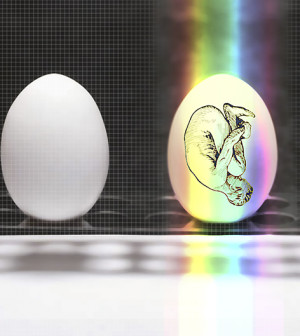- Could Your Grocery Store Meat Be Causing Recurring UTIs?
- Are You Making This Expensive Thermostat Error This Winter?
- Recognizing the Signs of Hypothyroidism
- 10 Strategies to Overcome Insomnia
- Could Artificial Sweeteners Be Aging the Brain Faster?
- Techniques for Soothing Your Nervous System
- Does the Water in Your House Smell Funny? Here’s Why
- Can a Daily Dose of Apple Cider Vinegar Actually Aid Weight Loss?
- 6 Health Beverages That Can Actually Spike Your Blood Sugar
- Treatment Options for Social Anxiety Disorder
Gene Tied to Breast Cancer Raises Uterine Cancer Risk Too

Women with a gene mutation known as BRCA1 have an increased risk for a deadly form of uterine cancer, a new study finds.
The BRCA1 gene mutation is already well known for significantly increasing the risk of breast and ovarian cancers. In fact, the risk is so high that some women consider having both breasts, as well as their ovaries, removed to prevent breast and ovarian cancers, the researchers noted.
This latest study is the first to find a conclusive link between the mutation and a slight increase in the odds of developing an aggressive uterine cancer, the researchers said.
The study authors looked at data from nearly 1,100 U.S. women with BRCA1 or BRCA2 mutations. The women were from the United States and the United Kingdom. Their health was followed for a median of about five years. BRCA2 also raises the risk of breast and ovarian cancers, according to the U.S. National Cancer Institute.
During the research period, eight of the women in the study were diagnosed with uterine cancer, a rate that’s slightly higher but not statistically different than for women in the general population.
However, five of those cancers were an uncommon and highly aggressive type called serous endometrial cancer. Four out of five of those cancers occurred in women with the BRCA1 mutation, the study showed.
“We were surprised when we saw the data,” study author Dr. Noah Kauff, head of the Clinical Cancer Genetics Program at the Duke Cancer Institute, said in a university news release.
“This is an event that should not occur in the over 600 women with BRCA1 mutations in our study. Even if we followed these women for 25 years, you would only expect to see no more than one serous cancer,” he explained.
The study was published online June 30 in the journal JAMA Oncology.
The findings could help women with the BRCA1 mutation and their doctors make treatment decisions, the researchers said.
“Our findings suggest that it may be important for women with BRCA1 mutations to consider removing their uterus at the time they are considering removing their ovaries and fallopian tubes, unless they are hoping to still have children using assisted reproductive methods or have other medical reasons,” Kauff said.
But, if women have already had surgery to remove their breasts, ovaries and fallopian tubes, the benefit of having another surgery to remove the uterus is less clear, the researchers said.
Kauff said that more studies need to be done to see whether or not a 3 to 5 percent risk of serous uterine cancer over 25 years justifies the costs and potential complications of a second surgery.
More information
The U.S. Office on Women’s Health has more on uterine cancer.
Source: HealthDay
Copyright © 2026 HealthDay. All rights reserved.










